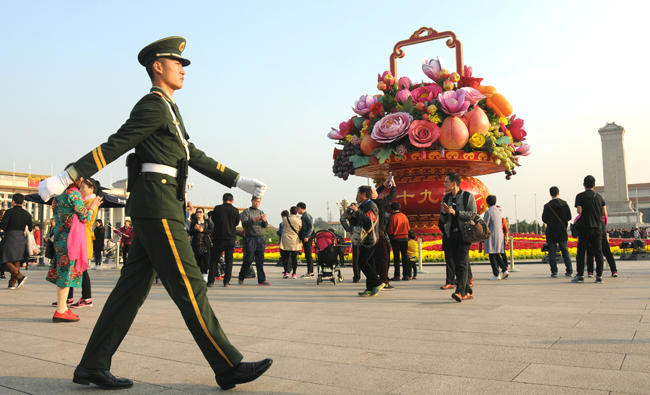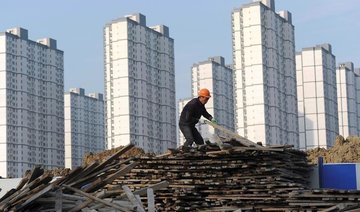BEIJING: China’s Communist Party announced Saturday that it agreed to amend its constitution, ahead of a keenly-watched congress, with speculation mounting that leader Xi Jinping’s name will be added to the document, enshrining his legacy.
The Central Committee said it had passed an amendment to the party’s constitution at the end of a plenary meeting held in advance of the main twice-a-decade congress, which opens Wednesday and is expected to see Xi tighten his grip on power.
“The document will be submitted to the upcoming 19th CPC National Congress for review,” it said in a statement released through the official state news agency, without giving further details.
The congress is expected to see Xi granted the customary second five-year term as general secretary of the Communist Party, thereby renewing his de facto mandate to serve as president of the world’s second-largest economy.
The official Xinhua news agency said last month that the constitution will be amended during the congress to “reflect the new governance concepts, thoughts and strategies” developed by the Central Committee since the last meeting five years ago.
Analysts speculate that Xi’s name could be added to the party’s constitution, elevating him into the exclusive pantheon of Chinese leaders.
That privilege has only been granted to Xi’s two most powerful predecessors, Mao Zedong and Deng Xiaoping.
The Communist commandments currently features “Mao Zedong Thought” and “Deng Xiaoping Theory,” with the political philosophies or ideas of other leaders included without their names.
This weeks congress is hotly anticipated to herald a significant shake-up in the leadership ranks, with five out of seven members of the Politburo Standing Committee that rules over China set to be replaced.
Saturday’s statement from the Central Committee also endorsed the expulsion of Sun Zhengcai, the former Chongqing city head once considered a possible successor to Xi.
He was kicked out of the party in September after being ensnared in a wide ranging anti-corruption drive by Chinese leader that has toppled party officials, including potential rivals.
China Communist Party agrees to amend constitution at key conclave
China Communist Party agrees to amend constitution at key conclave

Germany ‘deeply concerned’ about situation in Gaza

- A broad military offensive also risks worsening further the catastrophic humanitarian situation for Gaza’s population and the remaining hostages
BERLIN: Germany is “deeply concerned” about the situation in Gaza, where it said an intensified Israeli offensive could endanger the lives of hostages, including Germans, the Foreign Ministry said Saturday.
The offensive “could put the lives of the remaining hostages, including those of German hostages, in danger,” said a ministry statement.
“A broad military offensive also risks worsening further the catastrophic humanitarian situation for Gaza’s population and the remaining hostages,” it added.
Italian Foreign Minister Antonio Tajani earlier urged Israel to stop its military offensive in Gaza, saying that Palestinian civilians must no longer pay the price of war.
“We have to tell the Israeli government ‘that’s enough’,” Tajani said in a statement.
“We no longer want to see the Palestinian population suffer. Stop the attacks, let’s secure a ceasefire, free the hostages, but leave in peace a people who are victims of Hamas,” he added.
The comments reflect growing international disquiet over Israel’s relentless attacks on Gaza.
Israel’s military campaign has devastated the tiny, crowded enclave, pushing nearly all its 2 million inhabitants from their homes and killing more than 53,000 people, according to Gaza health authorities.
Tajani was due to meet US Secretary of State Marco Rubio in Rome.
The Italian government has been one of Israel’s most vocal supporters within Europe, but unease is building over the devastation being wrought on Gaza.
Also on Saturday, a senior Hamas official said a new round of indirect negotiations with Israel aimed at ending the war in Gaza started in Doha “without any preconditions.”
“This round of negotiations began without any preconditions from either side, and the negotiations are open to discussing all issues,” said senior Hamas official Taher Al-Nunu.
“Hamas will present its viewpoint on all issues, especially ending the war, (Israel’s) withdrawal and prisoner exchange.”
Prior rounds of negotiations have failed to secure a breakthrough on ending the war, and a two-month ceasefire between the sides fell apart when Israel resumed its operations in Gaza on March 18.
UN scales back aid goals in Yemen and Somalia

- UN agencies are scaling back operations and staffing around the world as they grapple with big cuts in contributions from member states
UNITED NATIONS, United States: The United Nations announced Friday it is scaling back its humanitarian aid goals in Yemen and Somalia in the latest fallout from a drastic drop in funding from member states.
It said the cuts are putting millions of lives at risk around the world.
In January the UN launched an appeal for $2.4 billion to help 10.5 million people in war-torn Yemen this year, far below the 19.5 million people it deems as being in need of assistance.
But with funding down, the global body and its humanitarian aid partners established new priorities so as to be able to help at least the neediest people there.
The UN announced similar changes in strategy in Ukraine and Democratic Republic of Congo in recent weeks.
Now the focus in Yemen will be on 8.8 million people with a forecast budget of $1.4 billion, said Stephanie Tremblay, a spokeswoman for UN Secretary-General Antonio Guterres.
In violent and unstable Somalia, an initial $1.4 billion plan to help 4.6 million people has also been trimmed back to $367 million for 1.3 million people, she said.
“This does not mean that there’s been a reduction in overall humanitarian needs and requirements,” Tremblay said.
She said huge funding cuts are forcing humanitarian aid programs to scale back, “putting millions of lives at risk across the world.”
“As in other crises, the consequence will be dire. If we fail to deliver, millions more people will be acutely hungry and lack access to clean water, education, protection and other essential services,” she added.
UN agencies are scaling back operations and staffing around the world as they grapple with big cuts in contributions from member states, in particular the United States under President Donald Trump.
Pro-Palestinian protesters, police clash in Basel during Eurovision

- Protesters clashed with police before Israel’s Eurovision entrant Yuval Raphael went on stage
BASEL: Pro-Palestinian demonstrators clashed with riot police in Basel as the Swiss city hosted the Eurovision Song Contest on Saturday, according to AFP journalists at the scene.
Protesters demonstrating against Israel’s participation in the contest while it ramps up its war in Gaza clashed briefly with police in the center of the city shortly before Israel’s Eurovision entrant Yuval Raphael took to the stage at the St. Jakobshalle venue across town.
Civilians expelled to Rwanda by fighters

- UNHCR: ‘Returns of refugees to countries of origin must be voluntary’
GOMA: Armed fighters from the M23 group, which has taken control of eastern DR Congo’s key major town of Goma, on Saturday set about expelling thousands of people they say are illegals from Rwanda, witnesses said.
On Monday, the group’s military spokesman, Willy Ngoma, had presented to the media 181 men whom they referred to as “Rwandan subjects” illegally in the country at Goma’s main sports stadium.
All the men shown had ID papers from the DRC, which the M23 asserted were bogus.
An AFP reporter said the armed group had summarily burned the documents on the stadium pitch.
Several hundred women and children, relatives of those detained, joined them at the stadium aboard trucks chartered by the M23.
One of the men arrested, who gave his name only as Eric, had said on Monday that he was from Karenga, located in North Kivu, which is considered a stronghold of the Democratic Forces for the Liberation of Rwanda, or FDLR.
The FDLR is an armed group founded by former Rwandan Hutu leaders of the 1994 Tutsi genocide.
Early on Saturday, 360 people were loaded onto buses from Goma, Eujin Byun, said a spokesperson for the UN High Commissioner for Refugees.
The UNHCR stressed that “returns of refugees to their countries of origin must be safe, voluntary, and carried out with dignity, under international law.”
An AFP correspondent reported that the convoy crossed the border to Rubavu, in western Rwanda.
“We will do everything to reintegrate them into society, so that they have the same responsibilities and rights as other Rwandans,” said Prosper Mulindwa, mayor of Rubavu district.
The M23 and Kigali accuse Kinshasa of supporting the FDLR and have justified their offensive in eastern DRC by a need to neutralize that group.
Most of the families expelled by the M23 are from Karenga and had been prevented from returning there after the M23 took over Goma, according to security and humanitarian sources.
The sources said the families lived in a reception center for displaced persons in Sake, some 20 km from Goma.
In March, 20 suspected FDLR fighters, dressed in Congolese Armed Forces uniforms, were handed over to Rwandan authorities by the M23.
Kinshasa denounced the incident as a “crude fabrication” intended to discredit its army.
Gabon’s ousted President Bongo flies to Angola with wife and son

- The family’s release followed talks between Angolan President Joao Lourenco and Gabon’s new leader, Brice Clotaire Oligui Nguema
LUANDA: Gabon’s former leader, Ali Bongo Ondimba, who was detained after being ousted in a 2023 coup, has been released and has gone to Angola with his family, the Angolan presidency said.
Bongo, whose family ruled Gabon for 55 years, had been under house arrest in the capital, Libreville, since being overthrown in August 2023.
His wife and son had also been in detention, accused of embezzling public funds.
A statement on the Angolan presidency’s Facebook page announcing the arrival of the Bongo family in the capital, Luanda, was accompanied by photographs showing the former leader being welcomed at an airport.
The “Bongo family has been released and has just arrived in Luanda,” it said.
The release of the family followed talks between Angolan President Joao Lourenço and Gabon’s new leader, Brice Clotaire Oligui Nguema, the statement said.
Lawyers for the Bongos in France said their release had been the “result of long efforts on both the judicial and diplomatic levels.
“After 20 months of arbitrary and cruel detention accompanied by torture, the family is finally reunited around the former president Ali Bongo,” they said in a statement.
But a prosecutor in Libreville said Bongo’s French-born wife Sylvia, 62, and son Noureddin, 33, had only been provisionally freed, awaiting a trial for alleged embezzlement.
Prosecutor Eddy Minang said the pair’s release “does not in any way interrupt the normal course of the proceedings, which will continue until a fair, transparent, equitable and timely trial is held.”
Oligui, a former junta leader, seized power in the August 2023 coup that ended the 55-year rule of the Bongo dynasty.
The general was sworn in earlier this month after winning 94.85 percent in an April 12 vote in which international observers signaled no major irregularities.
Oligui’s main rival, Alain-Claude Bilie By Nze, the last prime minister under Bongo, said the family’s release demonstrated that their detention “did not respect the framework of law and justice.
“President Oligui Nguema did not show clemency: He had to bow to international demands after what everyone understood to be an abuse of power,” he said.
Lawyers for Sylvia and Noureddin alleged they had suffered torture while in detention.
Several Gabonese news media reported recently that they had been moved from cells in an annex of the presidency to a family residence in Libreville.
A member of Gabon’s transitional parliament, Geoffroy Foumboula Libeka, said the move of the family “in the middle of the night and total silence” was “a real disgrace for the first days” of the new government. “Where is Gabon’s sovereignty?” he asked on social media.
The Bongo family’s release, he said, was “the price to pay” for the country’s reintegration into the African Union, which Angolan leader Lourenco currently heads.
The African Union announced on April 30 that it had lifted sanctions against Gabon, which was suspended from the organisation following the coup.
The country of 2.3 million people has endured high unemployment, regular power and water shortages, and heavy government debt despite its oil wealth.
The Gabon presidency announced on social media on May 12 that Lourenco had met Oligui in Libreville for talks focused “on strengthening bilateral cooperation, the smooth running of democratic elections marking the end of the transition in Gabon.”
They also discussed lifting sanctions following Gabon’s reintegration into the AU.
Bongo, 66, who is suspected to be in poor health, came to power in 2009, taking over from his father, Omar Bongo Ondimba, who ruled for 41 years.
In 2016, he was narrowly reelected for a second term by a few thousand votes, beating opposition challenger Jean Ping after a campaign marred by bloody clashes and allegations of fraud.
He suffered a stroke in October 2018 while on a visit to Saudi Arabia, and there was speculation about his health and fitness to govern when he returned home.
His public appearances were rare, and the times when he spoke live outside the confines of the presidential palace were rarer still.
Bongo ruled for 14 years until he was overthrown moments after being proclaimed the winner in a presidential election the army and opposition declared fraudulent.






















